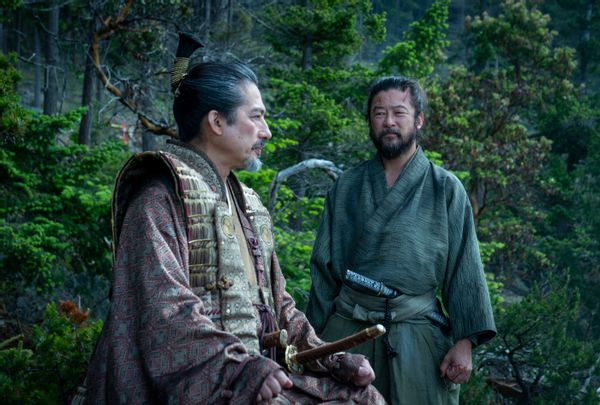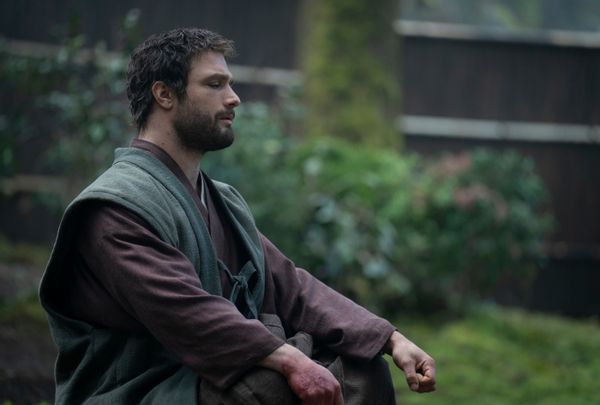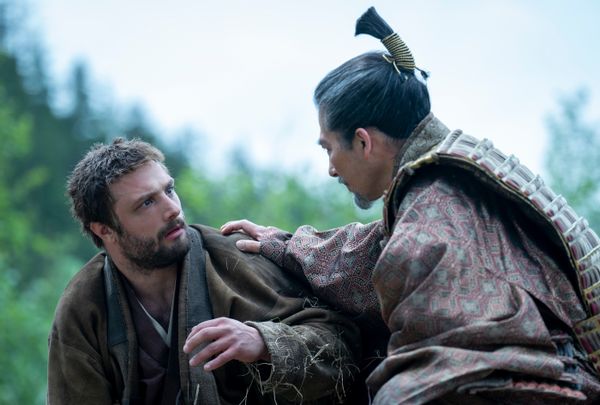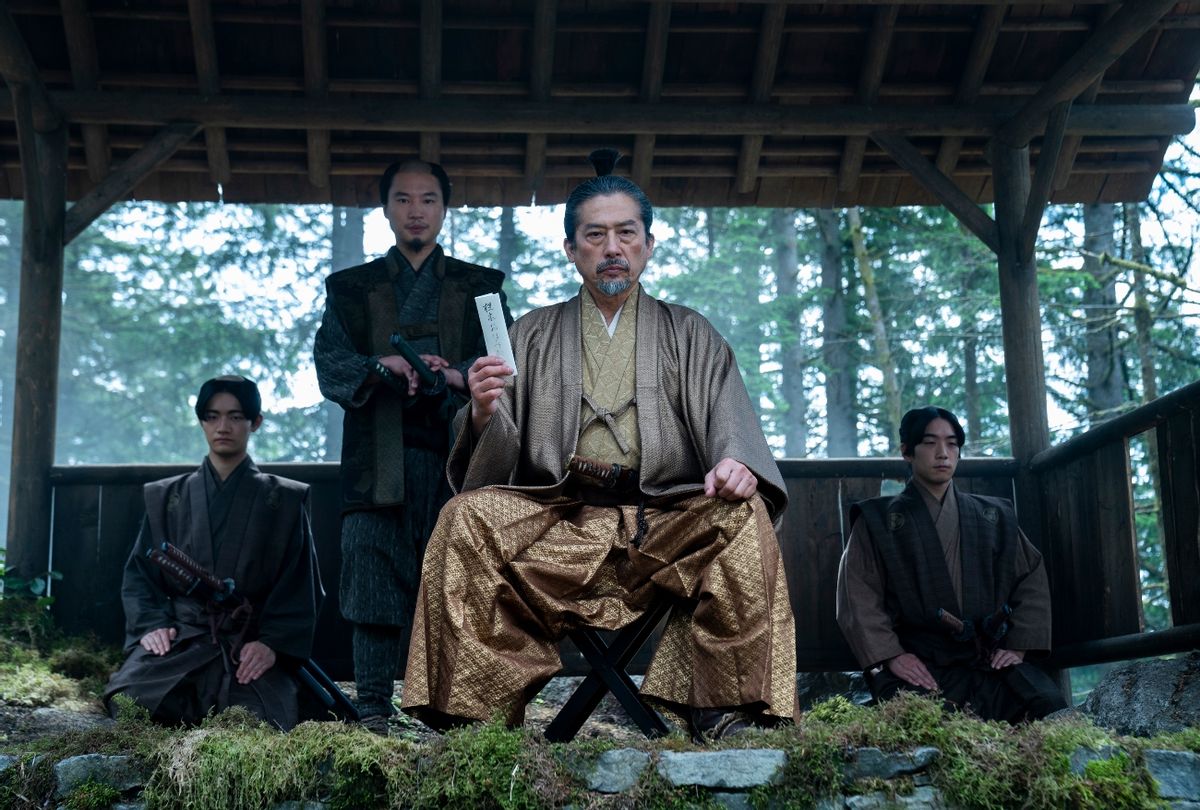At the climax of 10 episodes spent spinning up a war, the titular leader of “Shōgun” guarantees that we won’t see one.
This is as its hero Lord Toranaga (Hiroyuki Sanada) intended. As he explains to his traitorous vassal Yabushige (Tadanobu Asano) moments before stabs himself in the gut, marching into the battle against his united enemies would have spelled bloody defeat.
"We were banking on the dragons within and encountering other dragons within."
Instead, he sent Lady Mariko (Anna Sawai) to Osaka both to antagonize his adversary Ishido (Takehiro Hira) and show her childhood best friend Lady Ochiba (Fumi Nikaido) the kind of scrub she’d sided with. Whether Toranaga expected Mariko would die in the course of fulfilling her duty isn’t clear, but her assassination swayed Ochiba to his cause.
“I sent a woman to do what no army could,” Toranaga tells Yabushige, explaining that her actions were, in fact, the crux of his mysterious Crimson Sky strategy. Her sacrifice cleared the path for Toranaga to forge a nation without wars, “an era of great peace,” he says.
 Hiroyuki Sanada as Lord Toranaga and Tadanobu Asano as Yabushige in "Shogun" (Katie Yu/FX)“Shōgun” unfurls as a collection of elegant feints. James Clavell’s 1975 novel and the 1980 TV adaptation foregrounds the perspective of an English sailor who washes up on the shores of Japan. In this version, the white guy is a distraction and nothing more. We’re primed to side with Toranaga, portrayed as a noble lord who only wants the best for Japan’s underage regent and the country itself.
Hiroyuki Sanada as Lord Toranaga and Tadanobu Asano as Yabushige in "Shogun" (Katie Yu/FX)“Shōgun” unfurls as a collection of elegant feints. James Clavell’s 1975 novel and the 1980 TV adaptation foregrounds the perspective of an English sailor who washes up on the shores of Japan. In this version, the white guy is a distraction and nothing more. We’re primed to side with Toranaga, portrayed as a noble lord who only wants the best for Japan’s underage regent and the country itself.
“All of us have made this possible. You, me, Mariko, even the barbarian who came out of the sea,” he continues, referring to Cosmo Jarvis’ John Blackthorne. He neglects to mention Hiromatsu (Tokuma Nishioka), his wisest counsel, whose protest suicide kicks off the entire gambit.
By that point in the finale, “A Dream of a Dream,” we may have gotten the message that Toranaga doesn’t think much of the people around him or their lives. Toranaga knew Yabushige wasn’t to be trusted but sent him to Osaka with Mariko anyway. The minor lord didn’t intend his betrayal to result in Mariko’s death, but it did.
When Blackthorne and Yabushige’s ship pulls into the bay near the turncoat daimyo’s village to bring home her remains, the Englishman sees his ship has been burned and sunk, and that Toranaga is randomly executing peasants in the name of rooting out the disloyal perpetrators. Toranaga drives Blackthorne to nearly kill himself before the lord will agree to stop killing the villagers.
It's only to Yabushige that Toranaga admits to orchestrating the ship’s arson himself, along with navigating every other piece in place. Despite Toranaga’s frequent denials of desiring to be shōgun, that was always his plan.
Toranaga’s a celebrated warrior, political tactician and a paragon of honor. But he also understands the power of theater, which is a nice way of dressing up deceit. “A Dream of a Dream” doesn’t quite amount to his unmasking, but it provides a full understanding of what type of protagonist we might have been pulling for this whole time.
Series creators Justin Marks and Rachel Kondo didn’t necessarily intend to mark Sanada’s lord as the series’ hero. That honor was always Mariko’s. “The book really does wrap the whole spine of the story around her trajectory,” Marks explained to Salon, “so we focused it in that direction.”
 Cosmo Jarvis as Blackthorne in "Shogun" (Katie Yu/FX)As for Blackthorne, Clavell's white savior, “The journey of his character is letting go of himself and accepting that he has no real privileged agency over this world,” Marks said. “We thought that was a really important message to hit in any era, you know, but especially today.”
Cosmo Jarvis as Blackthorne in "Shogun" (Katie Yu/FX)As for Blackthorne, Clavell's white savior, “The journey of his character is letting go of himself and accepting that he has no real privileged agency over this world,” Marks said. “We thought that was a really important message to hit in any era, you know, but especially today.”
Fair enough, but what does Toranaga’s reveal tell us about what we value in leadership and power? Marks and Kondo address that and other aspects of the character's development in our conversation, which took place before the limited series’ premiere in Pasadena, Calif.
“Shōgun” is being compared to “Game of Thrones,” mainly because that’s a familiar reference that perhaps captures its scope. On the one hand, that’s a huge compliment. But before we get into other aspects of what that means, let’s talk about how Toranaga’s plan culminates.
The entire season builds toward the expectation of a climactic battle, but “Shōgun” resolves without delivering one. I appreciated that, but that’s also kind of risky because I’m guessing that most viewers expect a massive action piece.
Justin Marks: Strangely, that was the same experience of reading the book. It’s exactly how the book ends, although we tied a prettier bow on it in certain respects, because we're a closed-ended series.
Historically, this does culminate in a battle, Sekigahara, and there was a lot of bloodshed. But the difference is the outcome of the battle was essentially predetermined because of everything that has already happened. That's what Toranaga’s plan has been in our story and in the book as well.
Rachel Kondo: I guess we were banking on the noise and the explosions [occurring] internally, especially in Episode 9. A lot of my experience of the book was so visceral. Right? You've seen the episodes. When Mariko dies in the book, that was when I had to close the book and just say, "I need a minute," because of that emotional upheaval and shock and astonishment.
We had all the stuff that you get with these big battle scenes — all the stuff you get with “Game of Thrones” and the dragons streaking across the sky. We were banking on the dragons within and encountering other dragons within.
Yes, and “Game of Thrones” aired over many seasons, and was eventually viewed as a reflection of the politics and the mores of our time, which brings us to the way our view of Toranaga might change by the end of “Shōgun.”
Marks: When you talk about these qualities of leadership, yes, you can't take culture out of it. But that's where we also step back and try to withhold commentary one way or another.
Toranaga is based on the real-life figure Tokugawa Ieyasu, the man who ushered in 260 years of peace in Japan, but also closed the doors and in doing so made it a very isolated place.
I think we came into it originally as a very complicated Great Man kind of archetype. I can look at his character from the outside, from my modern-day perspective, and see him as someone who sent a lot of people – and a baby! — to die in service of this ambition. It's a very difficult, complex thing.
We need your help to stay independent
Within Japan, or at least with Hiro and our conversations, you have to look at it from the place of what he created for the next 260 years. And yes, it is a “Do ends justify the means?” conversation. But we wanted to neither lionize that type of figure nor otherwise. I think the last look between him and Blackthorne acknowledges the sort of control that exists, the invisible strings that he exerts over him.
 Cosmo Jarvis as Blackthorne and Hiroyuki Sanada as Lord Toranaga in "Shogun" (Katie Yu/FX)Is that something to applaud? I don't know. But again, look at what he created. The same could be true for any leader in our history with its very complex legacy. Some of us want to really simplify it and just forget about all the complex, messy details in between. There's also the temptation to get lost in all the details, and then you don't believe in anything.
Cosmo Jarvis as Blackthorne and Hiroyuki Sanada as Lord Toranaga in "Shogun" (Katie Yu/FX)Is that something to applaud? I don't know. But again, look at what he created. The same could be true for any leader in our history with its very complex legacy. Some of us want to really simplify it and just forget about all the complex, messy details in between. There's also the temptation to get lost in all the details, and then you don't believe in anything.
So it's a tricky balance that we tried to create.
I can imagine. And this series spends a lot of time intentionally winning us to Toranaga’s side only to drive home, in the end, that we've been admiring an authoritarian.
Kondo: Toranaga is the embodiment of the word complex. He's a little bit right, and he's a little bit wrong. It all comes down to perspective.
As you said, James Clavell wrote the ending that way. But we're also in an uneasy period right where a lot of people are doing something similar with world leaders and a certain presidential candidate. Now, to be fair, people made those same observations about Daenerys Targaryen at the end of “Game of Thrones.”
Kondo: That's why I found it fascinating to experience Toranaga through the eyes of Mariko. Because here we have this loyal, devoted vassal who gave her life for his cause. And up until that point, I was kind of with you in the lionizing of this man for whom she would give anything. Then at the point of her death, that shifted my perspective and made me say, “Wait a second. He just sacrificed this life – this story and this ache and all these things that she was, and for what?”
Want a daily wrap-up of all the news and commentary Salon has to offer? Subscribe to our morning newsletter, Crash Course.
You’re a better person than I am because the moment it hit me was when he ordered the slaughter of the villagers —
Marks: As performance art . . .
Exactly.
Marks: . . . in order to get a reaction out of Blackthorne – to use Toranaga’s analogy when he’s talking about falconry – to break him to the fist.
But it speaks to the kind of man we think it takes to be the Great Man, again, in the capital sense. I went into it early, and Rachel knows this, with the sort of bold proclamation that we don't do this to celebrate great men in that sense. And we wanted to be very careful about what we're saying about Toranaga. And in the conversations with Hiro and bringing this story out, I think we started to see more of the shades of gray.
We began to see this is a story about control over chaos and agency, and how we exert that control.
"I hope it’s seen as not the ending we thought we were going to get, but the one we need."
The times he lived in, he couldn't control and the violence of those times and what would have been around the corner had he not been there. What he could control was how he turned it. I mean, how he adjusted his own sails in those winds. And who's to say that wasn't the best possible choice one could make? But man, I don't know what it does to the soul, and I hope to never have to know.
But it’s a great twist in the book. It really is. . . . And it's been right there the whole time. I mean, the book is called “Shōgun.” But I hope, even though it's unexpected, I hope it’s seen as not the ending we thought we were going to get, but the one we need.
All episodes of “Shōgun" are streaming on Hulu.



Shares